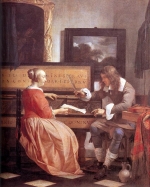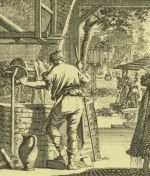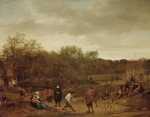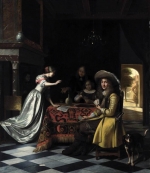James Jurin wrote Letter L-571 to Leeuwenhoek summarizing and praising his life's work
The date is New Style, which was eleven days ahead of the Old Style date of 22 February 1722 used in London.
Jurin read this letter to the Royal Society on the same day he dated it (Journal Books XII).
He introduced himself to Leeuwenhoek as the new Secretary of the Royal Society and expressed admiration for his work.
James Jurin (1684-1750), was an English physician and proponent of smallpox vaccination. As a supporter of Royal Society president Isaac Newton, Jurin became a fellow of the Royal Society in 1717. As its secretary from 1721 to 1727, he edited volumes 31-34 of Philosophical Transactions, in which he published 15 of Leeuwenhoek’s final letters addressed to him and to the Royal Society.
The present letter begins the exchange of letters between L. and Jurin that would continue to the end of L.’s life.
MS. copy Wellcome MS. 6143
Crane Court
Febr. 22d, 1721/2
Sir,
The Royal Society having been pleas'd to entrust me with the care of their Correspondence, I have in a particular manner received their commands to continue and cultivate that communication, which has so long and so usefully subsisted between yourself and the Secretaries of the Society. It is with che greatest pleasure, that I embrace this 86 1722 opportunity of conversing with a Person, from whose writings I have reaped so much information, and of the truth of many of whose discoveries I have upon a careful examination been an Eye Witness. Bur it is needless, Sir, to inform you of my own personal sentiments of esteem and respect for you, when I have rhe honour to assure you in the name of the Royal Society, that they set rhe highest value upon your Labour, and that they look upon nor themselves only, bur the whole Philosophick World, & Mankind in general, to be greatly obliged to you, on account of those many valuable discoveries, which you have been pleas'd from time to time to communicate to them. They see and observe with pleasure that neither the fatigue of your continued Labours during more than half a Century, nor the Autumn, as your Friend expresses it, nor even f Winter of Life, have been able to retard you in the pursuit of Nature, or to damp that generous and noble ardour, rhat first engaged you in the service of Philosophy. They concurr in judgement with that Gentleman, and promise themselves, that these Autumnal fruits of a long Experience, of a settled Judgement, & an habitual Dexterity, will be durable & lasting in proportion to their Maturity. Your late Observations have been principally rurn'd to the noblest and most difficult of Natural Subjects, the constitution of an Animal Body; and the fabrick of the most intricate, the most minute, and the most delicate parts of it has not been subtile enough to escape your Penetration, wch has been able to disclose to us the almost invisible cavities of the Fibrilla of ye Bones, of the Muscles, the Membranes, and even of the Nerves themselves. The Royal Society has a just sense of the importance of these discoveries, and it is their earnest desire, that, as there is little reason to hope, that human Industry can go much farther in these particulars, they may however by repeated Observations be so confirm'd and set in such a Light, that the most incredulous may have no room to dispute the truth of them. This, Sir, is what can be expected only from your self, for though you may leave behind you those incomparable Glasses, through which nature has so often discover'd her self unveil'd and naked yet where shall we find another Leeuwenhoek to employ them with the same success? For this reason, the R.S. hope and promise them selves, though with a due and tender regard to your great Age, that you will continue to let them receive the fruits of that attention, with which you have always honour'd them, during the space of almost fourty years, that you have been a Member of their Body. They desire you will be pleased to accept the Volume of Philosophical Transactions, wch accompanies this Letter, as a slender pledge of the sincere affection and esteem they bear you, together wth 87 1722 their hearty wishes of healrh & happiness, to which give me leave to add the same, from, Sir,
Your most obedient & most humble Servant
James Jurin R.S. Secret.















